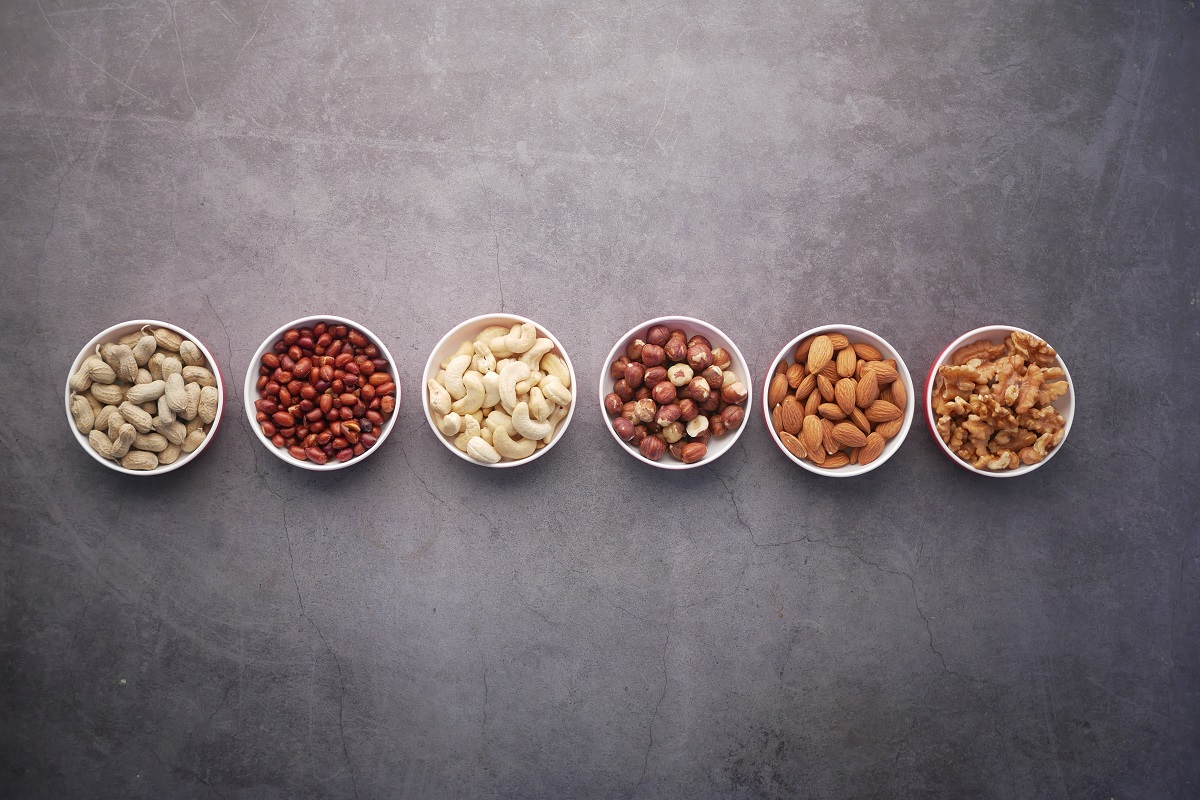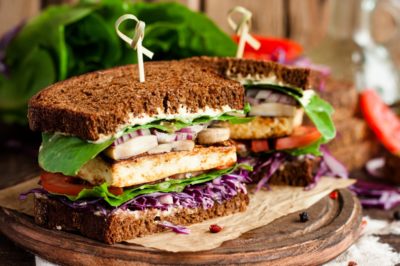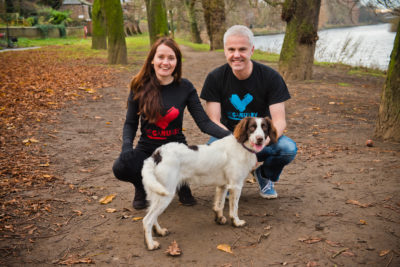When switching to a plant-based diet, it is normal to have questions about nutrition. What are macronutrients and how can we ensure we get the right nutrition on a vegan diet?

Rest assured, every nutrient we need is available to vegans, but it definitely helps if we know where to find them! If you have specific goals such as building muscle or you want to ensure you eat enough on a plant-based diet, understanding macronutrients can help.
Here, we consider the role of macronutrients, how much we need of them, and how some types are better than others.
What Are Macronutrients?
These are the nutrients that our bodies need in the largest quantities for energy and to keep all our bodily processes functioning.
There are three macronutrients: carbohydrates, proteins and fats and, although each can be obtained from a wide variety of foods, some sources are much better than others in terms of quantity and also quality of the nutrient.
Carbohydrates
These are our primary fuel source, giving us energy, not just for exercise but for our body’s routine processes, including for our brains, muscles and for breathing.
Adults should be aiming for somewhere in the region of 260g a day, which equates to around half of our calories but beware – not all carbohydrates are created equal.
Complex Carbohydrates
These are starchy, high-fibre foods that include wholemeal bread, pasta and rice. They take longer for our body to digest so we stay fuller, and they keep our blood sugar stable.
Grains, beans, and most vegetables and fruits are complex carbohydrates, and the fibre they contain is associated with a reduced risk of cardiovascular disease, type 2 diabetes and bowel cancer. Most adults don’t eat enough fibre, with the average intake falling far short of the 30g a day that is recommended.
To increase our complex carbohydrate intake, choose brown rice, wild rice, quinoa, millet, buckwheat, potatoes, sweet potatoes, oats, vegetables, beans, lentils, sweetcorn and chickpeas. Some fruits are also a good source of fibre including raspberries, apples and bananas.
Simple Carbohydrates
These are known as sugars, and they break down quickly in the body, which means we get a rush of energy followed shortly after by a crash. Any sugar that isn’t used is stored as fat. Simple carbohydrates are found sweetened foods, such as ice cream, cookies and sugary drinks, as well as in cows’ milk. These are best avoided.

Protein
Every vegan on the planet has probably been asked where they get their protein, but the truth is it is very easy to get sufficient amounts. Research is starting to indicate the many health benefits of getting it from plant-based sources instead of from meat.
Protein is essential for the proper functioning of the body and to provide structure to the tissues, as well as to regulate the metabolic, hormonal and enzyme systems. No wonder people are keen to know where to get it.
On average, adults need around 0.8g of protein per kilo of bodyweight, which equates to around 45-55g of protein per day. We all know animal products contain protein, but how do vegans ensure they are meeting their needs? Quite easily, actually!
Soya is a fantastic bean, and can be eaten as edamame, tofu or tempeh. But all beans are good sources of protein – kidney, butterbean, baked or others – and so are peas, lentils and chickpeas. Nuts and seeds are also good sources, and that includes peanut butter and tahini.
Grains contain a good amount, too, especially buckwheat, quinoa, brown rice and oats. And let’s not forget vegetables contain protein too, especially Brussels sprouts, sweetcorn, asparagus and broccoli.
The award though goes to seitan, a wheat protein used to make meat-style products, which is probably the most protein-rich vegan food around. One single serving is likely to contain the recommended daily amount.
Protein from Plants
The Physicians Committee for Responsible Medicine has collated some of the research that indicates the benefits of getting our protein from plants. It includes:
- A study published in 2020 which found that replacing red meat with high-quality plant proteins such as beans, nuts, and soya may be associated with a reduced risk of coronary heart disease.
- Another 2020 study found that eating plant-based protein from sources such as bread, cereal, and pasta instead of animal protein reduced the risk of death from heart disease by up to 12 per cent.
- Also in 2020, research published in British Medical Journal shows that plant-based protein reduces risk of early death from any cause and from heart disease. For each additional 3 per cent of calories from plant protein, the risk of dying reduces by 5 per cent. Consuming animal proteins did not lower risk of death from heart disease or cancer.
- A study published in 2019 found that those who consumed more meat and protein from animal-based sources instead of plant-based sources increased their risk of death from chronic disease by 23 per cent.
- Another study found that participants who ate the most animal protein had a fivefold increase risk of diabetes-related death. Under 65s who ate the most animal protein had a 74 per cent increased risk for death from any cause and a fourfold increase in death related to cancer.

Fat
We need some fat in our diet. It helps us absorb some vitamins (A, D, E), is needed to build cell membranes and is essential for blood clotting and muscle movement.
There are three kinds of fats: the good, the not-so-good and the industrial. Heart UK says we should get around one third of our energy from fat, which equates to around 70g-90g for adults. But there are some fats we should prioritise, and others we would do well to avoid.
The Good: Unsaturated Fats
Both monounsaturated and polyunsaturated fats are the healthier choices. For monounsaturated, think olive oil, peanut oil, avocados and nuts. These are all good, healthy fats, which are considered part of the Mediterranean Diet.
Polyunsaturated fats are known as essential fats, because we cannot make them in the body and we must get them from our diets. There are two types: omega-3 and omega-6. Good omega-3 sources for vegans are walnuts, flaxseeds, chia seeds, hemp seeds, and rapeseed oil. For omega-6 fats, vegetable oils, nuts and seeds provide all that we need.
The Not-So-Good: Saturated Fats
Saturated fats raise our blood cholesterol, which is why we are advised to limit them. Saturated fats are found in most animal products but some vegan products, including coconut oil, palm oil and some processed foods that are made with them, such as vegan cakes and biscuits.
People who eat a healthy vegan diet will naturally get very few of these fats, so their blood cholesterol is likely – though not guaranteed – to be within the healthy range. We should aim to eat no more than 20-30g of saturated fat a day.
The Industrial: Trans Fats
Harvard says this is the worst kind of dietary fat. It is a by-product of a process that turns healthy oils into solid fats. Trans fats are typically found in margarines, ice cream, pastries, cakes and fast food – even in the vegan versions.
They have been associated with heart disease, strokes, liver dysfunction, type 2 diabetes, Alzheimer’s and infertility. They raise ‘bad’ cholesterol and reduce healthy cholesterol. They have no known health benefits and there is no safe level of consumption.
Eating a wide range of whole foods – from grains and legumes to nuts, seeds, fruits and vegetables – should ensure vegans get all the macronutrients they need without any of the downsides associated with a diet rich in meat and dairy.




